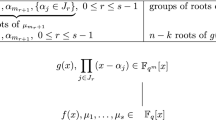Abstract
Schützenberger Conjecture claims that any finite maximal code C is factorizing, i.e. SC*P = A* in a non-ambiguous way, for some S, P. Let us suppose that Schützenberger Conjecture holds. Two problems arise: the construction of all (S, P) and the construction of C starting from (S, P). Regarding the first problem we consider two families of possible languages S: S prefix-closed and S s.t. S {1} is a code. For the second problem we present a method of constructing C from (S, P), that is relied on the construction of right- and left-factors of a language. Results are based on a combinatorial characterization of right- and left-factorizing languages.
This work was partially supported by 60% Project: “Linguaggi formali e modelli di calcolo”
Access this chapter
Tax calculation will be finalised at checkout
Purchases are for personal use only
Preview
Unable to display preview. Download preview PDF.
Similar content being viewed by others
References
M. Anselmo, A. Restivo: Factorizing Languages, Procs. 13th World Computer Congress IFIP 94 1, B. Pehrson and I. Simon eds., Elsevier Sc. B. V. North Holland (1994) 445–450
M. Anselmo, A. Restivo: On Languages Factorizing the free Monoid, Internat. J. of Algebra and Computation 6, n.4 (1996) 413–427
M. Anselmo, C. Defelice, A. Restivo: On some factorization problems, Bulletin of the Belgian Mathematical Society 4 (1997) 25–43
M. Anselmo: A Non-ambiguous Language Factorization Problem Procs. DLT 99 G. Rozenberg, W. Thomas eds., World Scientific (2000) 141–152
M. Anselmo. A Non-ambiguous Decomposition of Regular Languages and factorizing Codes, in revision for a journal
J. Berstel, D. Perrin: Theory of Codes, Academic Press (1985)
J. Berstel, Ch. Reutenauer: Rational Series and their Languages, EATCS Monographs 12, Springer Verlag (1988)
J. M. Boë: Sur les codes factorisants, in: Théorie des codes-Actes de la 7 école de printemps d’inf. théor., D. Perrin ed., LITP (Paris) (1979) 1–8
J. M. Boë: Sur les codes synchronisants coupants, in: Non-commutative Structures in Algebra and geometric combinatorics, A. de Luca, ed., Quaderni della Ric. Sc. del CNR 109, (1981) 7–10
J. M. Boë: Factorisation par excés du monoïde libre, LIRMM report 94-005, (1994)
V. Bruyère. Research Topics in the Theory of Codes, Bull. EATCS 48 (1992) 412–424
V. Bruyère, M. Latteux: Variable-length Maximal Codes, Procs. ICALP 1996 LLNCS Springer-Verlag (1996)
J. Brzozowsky: Open Problems about Regular Languages in R. V. Book, ed. Formal Language Theory, Perspectives and Open Problems, Academic Press, London, New York (1980)
M. Cariello: Fattorizzazioni non ambigue di linguaggi formali fattoriali e prefissiali Tesi di laurea, Univ. di Salerno, anno accademico 1996/97
C. De Felice: Construction et complétion de codes finis, Thèse de 3ème cycle, Rapport LITP 85-3, (1985)
C. De Felice: Construction of a family of finite maximal codes, Theor. Comp. Science 63 (1989) 157–184
C. De Felice: A partial result about the factorization conjecture for finite variablelength codes, Discrete Math., 122 (1993) 137–152
C. Defelice: On a property of the factorizing codes, Int. J. of Algebra and Computation 9 Nos. 3 & 4 (1999) 325–345
C. De Felice: Factorizing Codes and Schützenberger Conjectures, in Proc. MFCS 2000, Lecture Notes in Comput. Sci. 1893 (2000) 295–303
C. De Felice: On some Schützenberger Conjectures, Information and Computation, to appear (2000), journal version of [19]
C. De Felice, R. Zizza: Factorizing codes and Krasner factorizations, in Sixth Italian Conference on Theoretical Computer Science, World Scientific (1998) 347–358
S. Eilenberg: Automata, Languages, and Machines vol. A, Academic Press, New York (1974)
J. E. Hopcroft, J. D. Ullman: Introduction to Automata Theory, Languages, and Computation Addison-Wesley New York (1971)
D. Krob: Codes limités et factorisations finies du monoïde libre, RAIRO Inform. Théor. 21 (1987) 437–467
W. Kuich, A. Salomaa: Semirings, Automata, Languages, EATCS Monographs on Theor. Comp. Sc. 5 Springer Verlag, Berlin, (1986)
D. Perrin, M. P. Schützenberger: Un problème élémentaire de la théorie de l’information, “Théorie de l’Information”, Colloques Internat. CNRS 276, Cachan (1977) 249–260
C. Reutenauer: Non commutative factorization of variable-length codes, J. Pure and Applied Algebra 36 (1985) 167–186
A. Salomaa, M. Soittola: Automata-Theoretic Aspects of Formal Power Series, Springer, Berlin (1978)
M. P. Schützenberger: Sur certains sous-monoïdes libres, Bull. Soc. Math. France 93 (1965) 209–223
L. Zang, C. K. Gu: Two classes of factorizing codes-(p,p)-codes and (4,4)-codes, in M. Ito, H. Juergensen, eds., Words, languages and Combinatorics II, World Scientific (1994) 477–483
Author information
Authors and Affiliations
Rights and permissions
Copyright information
© 2001 Springer-Verlag Berlin Heidelberg
About this paper
Cite this paper
Anselmo, M. (2001). Constructing Finite Maximal Codes from Schützenberger Conjecture. In: Theoretical Computer Science. ICTCS 2001. Lecture Notes in Computer Science, vol 2202. Springer, Berlin, Heidelberg. https://doi.org/10.1007/3-540-45446-2_13
Download citation
DOI: https://doi.org/10.1007/3-540-45446-2_13
Published:
Publisher Name: Springer, Berlin, Heidelberg
Print ISBN: 978-3-540-42672-1
Online ISBN: 978-3-540-45446-5
eBook Packages: Springer Book Archive




